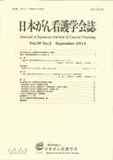Japanese
English
- 販売していません
- Abstract 文献概要
- 参考文献 Reference
- サイト内被引用 Cited by
要旨
目的:本研究の目的は,高齢者の造血幹細胞移植の体験を明らかにし,移植をいかに意味づけたのかについて明らかにすることである.なお,意味づけるとは,生きる価値や目的を意識することであり,移植を肯定的に捉え直すことと定義した.
方法:対象者は,急性白血病または,骨髄異形成症候群と診断され,大学病院一施設において移植を受けた60歳以上の患者とした.半構造化面接を行い,意味づけのプロセスを把握し,記述データは修正版グラウンデッド・セオリー・アプローチにより分析した.
結果:対象者は10名,男性9名,女性1名だった.移植時の平均年齢は66.3±3.5歳だった.高齢者の造血幹細胞移植の体験は,【血液がんと移植の過酷さとの対峙】に始まり,【人生経験から培った智慧と逞しさ】を駆使し,移植を乗り越えていた.そして,移植体験によって【余命をよりよく生きたい】という信念を獲得し,移植を自らの生き方に意味づけていた.
結論:高齢者が過酷な移植を生き抜いたプロセスにより,環境に適応する強靭さや新たなる信念を獲得し,内面的な成熟を遂げていた.本研究結果により高齢移植体験者が,智慧や人生経験による逞しさを高め,苦悩や生きがいを共有できるような個別性のある看護の必要性が示唆された.また,移植の意味づけを後押しするかかわりを通して,高齢者がさらに成長できるような支援が重要といえる.
Purpose:Reduced-intensity stem cell transplantation (RIST) has become a standard treatment for hematological malignancies in patients aged >60 years. However, RIST in the elderly is associated with high morbidity and mortality rates. The purpose of this study was to identify the process of meaning of RIST in the elderly.
Methods:Each participant submitted informed consent to participate in this study. All participants were aged >60 years, were diagnosed with acute myeloid leukemia or myelodysplastic syndrome, and received RIST at a university hospital. Semi-structured interviews were conducted to assess the process of acceptance of hematopoietic malignancies suffered by the participants. Descriptions were analyzed using a modified grounded theory approach.
Results:This study comprised 10 participants (9 males and 1 female), aged 60-70 years. The process of meaning of RIST for the elderly was classified into three core categories:(1)stress associated with a diagnosis of a hematopoietic malignancy and severe adverse events following RIST,(2)wisdom and vigor through life experiences, and (3)expectations of improved quality of life.
Conclusions:The search for meaning of RIST faced by the elderly who received RIST enabled them to overcome severe physical and mental distress associated with hematopoietic malignancies. Furthermore, in the surviving participants, wisdom, vigor, and life experiences were identified to be the most relevant attributes in the face of a life-threatening disease, which the elderly participants credited to their adaptation ability and personal strength acquired from life experiences. It is necessary to offer individualized nursing care based on the three described core processes to enable elderly RIST survivors to share their experiences and provide encouragement to support long-term survival. Furthermore, it is important to provide care for the elderly to achieve spiritual and emotional growth.
Copyright © 2014, Japanese Society of Cancer Nursing All rights reserved.


